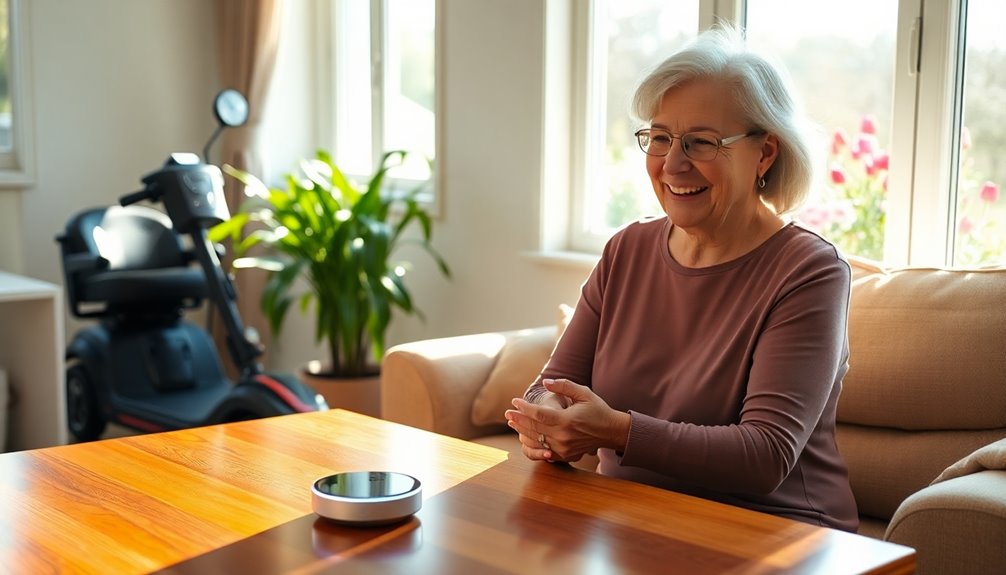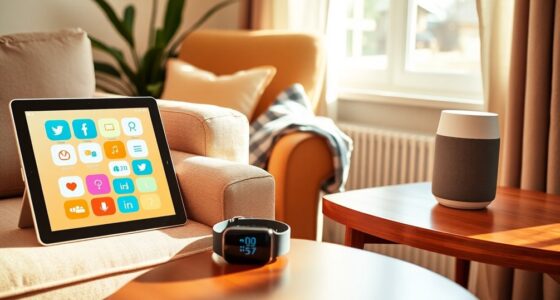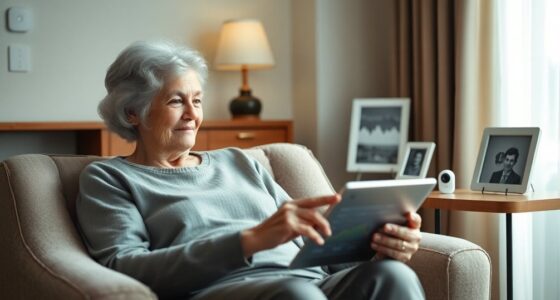Assistive technologies are revolutionizing senior independence by offering solutions like smart home devices for safety, health monitoring systems for proactive care, and mobility aids for better movement. Communication enhancements keep you connected, while kitchen modifications and reminder systems make daily tasks easier. Rehabilitation tools restore confidence, and wearable tech tracks health effectively. Virtual assistants help manage routines seamlessly. Explore these empowering technologies further to see how they can enhance your quality of life and independence.
Key Takeaways
- Smart home devices enhance safety by automating lighting, temperature control, and security monitoring, promoting a secure living environment for seniors.
- Health monitoring wearables track vital signs, enabling timely interventions and reducing hospital readmission rates by up to 30%.
- Mobility aids like smart walkers and advanced wheelchairs improve stability and encourage physical activity, boosting seniors' confidence and independence.
- Communication enhancements, including video calling and smart hearing aids, foster social connections, reducing isolation and improving emotional health.
- Kitchen modifications, such as non-slip flooring and adjustable-height counters, facilitate easier living and daily tasks for seniors with mobility challenges.
Smart Home Devices for Enhanced Safety

As you consider ways to enhance safety at home, smart home devices offer practical solutions that can markedly reduce risks for seniors.
Remote-controlled lighting systems allow you to navigate your home safely, even in low-light situations, minimizing fall risks. Automated thermostats maintain comfortable temperatures, preventing heat-related illnesses and improving well-being.
With smart security systems featuring cameras and motion sensors, you can monitor your surroundings in real time, ensuring safety while living independently.
Voice-activated virtual assistants help manage daily tasks, like medication reminders, promoting greater autonomy.
Additionally, integrating smart technology with emergency response systems gives you peace of mind by enabling quick alerts to caregivers in emergencies.
These smart home devices truly enhance safety and support independence for seniors.
Health Monitoring Systems for Proactive Care

Smart home devices aren't just about safety; they also play a significant role in health management. Health monitoring systems, like wearable devices, let you track essential signs such as heart rate, blood pressure, and oxygen levels. This continuous monitoring helps catch potential health issues early.
With remote health monitoring, caregivers can get real-time data, allowing for timely interventions and fewer hospital visits. Predictive analytics take it further by analyzing data patterns to forecast health complications, enabling proactive care adjustments.
Many devices come with mobile apps that remind you to take medications, promoting better health management. Studies show that using these systems can enhance health outcomes, reducing hospital readmission rates by up to 30% through timely interventions and improved self-management. Additionally, leveraging tax-loss harvesting strategies can further enhance financial management for seniors, potentially allowing them to invest more in their health care.
Mobility Aids Promoting Freedom of Movement
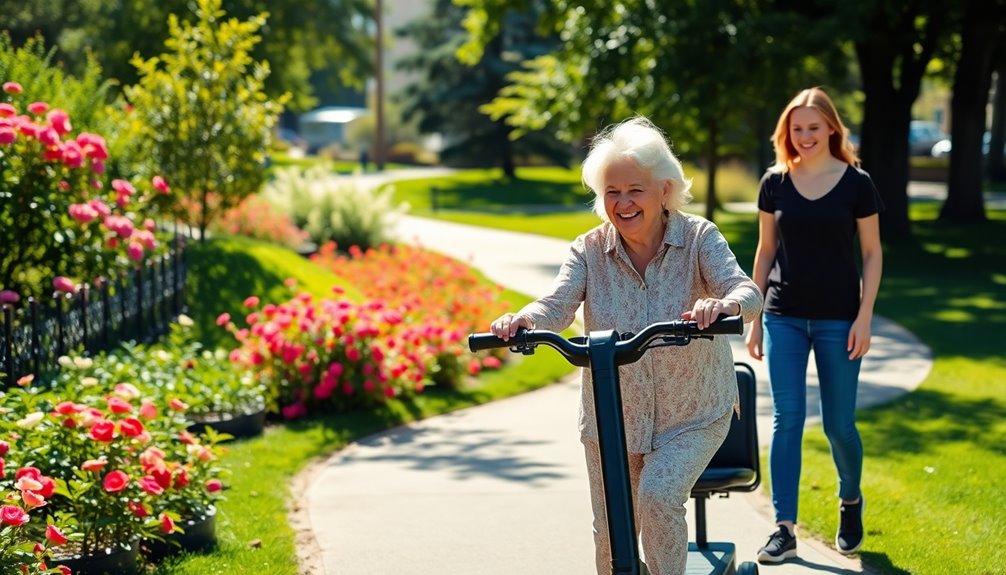
When it comes to maintaining independence, mobility aids are essential tools that enhance your freedom of movement. These devices, like smart walkers and advanced wheelchairs, improve your stability and greatly reduce the risk of falls.
Using mobility aids not only boosts your confidence but also encourages increased physical activity, which is vital for your overall health and well-being. Many modern aids come equipped with advanced technology features, such as GPS tracking and obstacle detection, making navigation safer and easier for you.
Communication Enhancements for Staying Connected
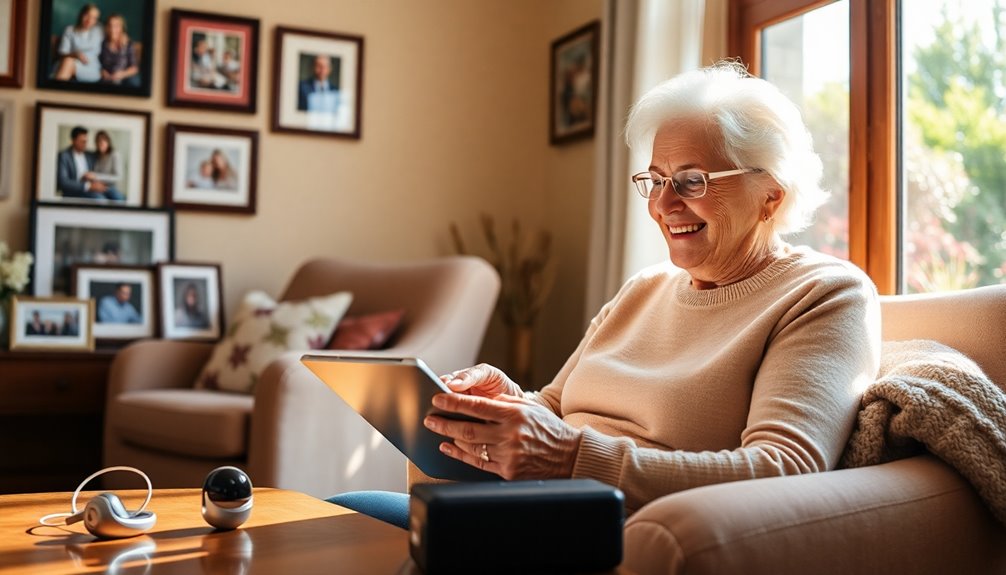
Staying connected is essential for your well-being, and communication enhancements can make it easier than ever.
With video calling applications, smart hearing aids, and social media platforms, you can engage with loved ones and maintain meaningful relationships.
These tools not only reduce feelings of isolation but also enrich your overall quality of life.
Video Calling Applications
Video calling applications, like Zoom and Skype, have transformed how seniors connect with loved ones, making it easier than ever to maintain meaningful relationships.
These platforms help you maintain independence and greatly reduce isolation. Regular video calls can enhance your mental health, with studies showing a 20% increase in happiness among seniors using these tools.
Here are some key benefits of video calling applications:
- Face-to-Face Interaction: Stay visually connected with family and friends.
- User-Friendly Interfaces: Designed with large buttons for easier navigation.
- Virtual Gatherings: Participate in family events through group calls.
- Improved Well-Being: Regular use boosts emotional health and reduces loneliness.
Embrace these technologies to foster connections and enhance your quality of life!
Smart Hearing Aids
Smart hearing aids are revolutionizing how seniors communicate and stay connected with the world around them.
These advanced devices use Bluetooth technology to link seamlessly with smartphones, allowing you to take calls and stream music directly. Many smart hearing aids come with noise-cancellation features, helping you filter out background sounds and focus on conversations, which considerably enhances communication in social settings.
You can also personalize your listening experience through mobile apps, adjusting settings for different environments. Some models even offer real-time translation, making it easier to converse in multiple languages.
Research shows that using smart hearing aids can markedly improve social engagement and overall quality of life, reducing feelings of isolation and fostering deeper connections with others.
Social Media Platforms
As social media platforms continue to evolve, they've become essential tools for seniors looking to maintain connections with family and friends.
These platforms not only enhance independence but also help reduce feelings of isolation.
Here are some key benefits:
- Increased Interaction: Engaging on platforms like Facebook and Instagram can lower loneliness and improve mental health.
- Face-to-Face Communication: Features like video calls on WhatsApp and Skype allow for meaningful conversations.
- Online Communities: Tailored groups enable sharing of hobbies and experiences, fostering a sense of belonging.
- Cognitive Stimulation: Exploring new technologies can stimulate the mind and potentially delay cognitive decline.
Additionally, recognizing signs of stagnation in relationships can motivate seniors to seek new connections and enhance their social lives.
Kitchen and Household Modifications for Easier Living

Making simple modifications to your kitchen and household can greatly enhance your independence and safety as you age. Start by installing non-slip flooring to reduce the risk of falls, a leading concern for seniors.
Consider smart kitchen appliances like automatic shut-off stoves and voice-command microwaves to improve usability. Lever-style faucets and pull-out shelves can make daily tasks easier for those with limited dexterity.
Adding grab bars near sinks and countertops provides support while cooking or cleaning, promoting greater independence in household activities.
Finally, implementing adjustable-height kitchen counters accommodates mobility aids, allowing you to engage comfortably in meal preparation and dining. Additionally, ensuring proper indoor air quality can further enhance your comfort and well-being while cooking and performing household tasks.
These kitchen modifications and assistive devices can greatly boost your confidence and ability to live independently.
Medical Alert Devices for Immediate Assistance

When it comes to guaranteeing safety, medical alert devices play an essential role in providing seniors with immediate access to help at the push of a button.
These devices considerably enhance your peace of mind and independence.
Here are four key features of modern medical alert systems:
- Fall Detection: Automatically alerts contacts or services if a fall is detected.
- GPS Tracking: Allows caregivers and emergency services to locate you quickly in an emergency.
- Two-Way Communication: Enables you to speak directly with emergency operators without needing a phone.
- Reduced Hospital Admissions: Studies show that using medical alert devices can lead to a 50% reduction in hospital visits due to falls.
With these features, medical alert devices guarantee you receive prompt emergency assistance when you need it most.
Reminder Systems to Support Daily Routines
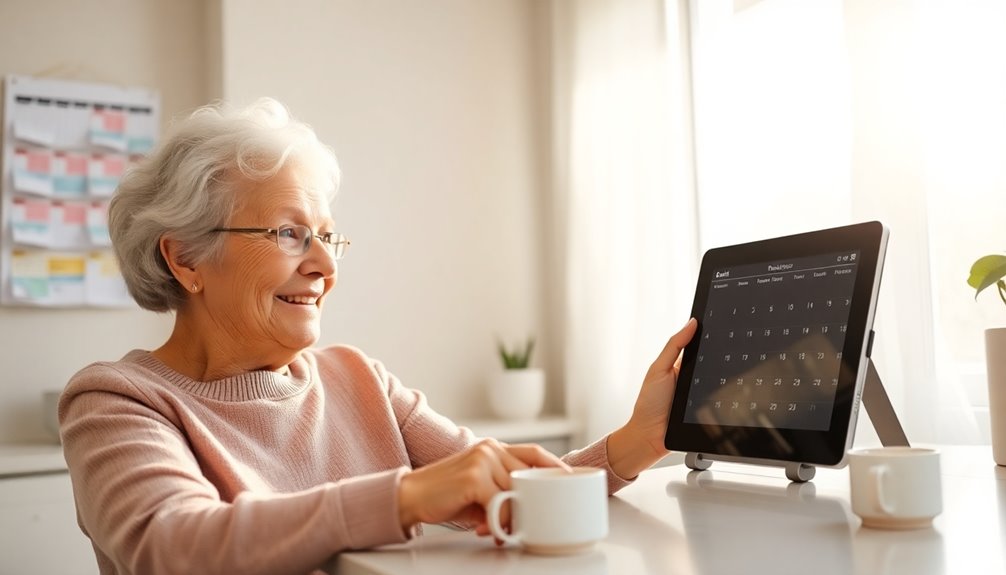
Effective reminder systems can greatly enhance daily routines for seniors, ensuring they stay on track with important tasks and appointments. These systems, such as medication management devices, help you adhere to prescribed schedules, reducing missed doses and improving health outcomes.
Digital assistants like Amazon Alexa and Google Home can be programmed to remind you of tasks and appointments, making time management easier. Wearable devices can alert you to take breaks, hydrate, or engage in physical activity, promoting overall well-being.
Customized reminder systems can be tailored to your specific needs, increasing compliance and satisfaction. Research shows that using these systems can remarkably lower anxiety related to memory loss, giving you and your caregivers peace of mind about daily routines.
Rehabilitation Tools for Restoring Confidence
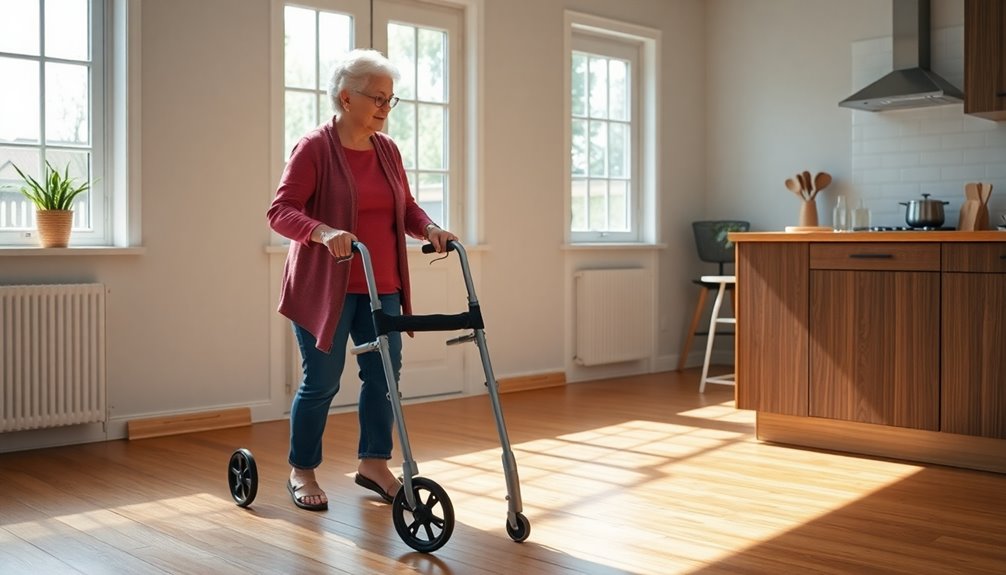
Rehabilitation tools can transform your daily life by enhancing your mobility and stability.
With devices like advanced walkers and grab bars, you can safely engage in everyday activities, boosting your confidence and independence.
As you regain your strength and ability, you'll find it easier to reconnect with social experiences you enjoy. Additionally, integrating advanced tuning techniques can further enhance your overall well-being by promoting an active lifestyle.
Enhancing Mobility and Stability
As you endeavor for greater independence, enhancing mobility and stability becomes essential, especially in traversing your daily environment.
The right mobility aids can greatly improve your confidence and safety. Consider these options:
- Advanced walkers: Designed to enhance stability and reduce the risk of falls.
- Smart scooters: Allow you to navigate your surroundings with ease and independence.
- Balance boards: Focus on strength and coordination, crucial for recovery.
- Gait trainers: Help restore mobility through targeted exercises.
Utilizing these rehabilitation tools can lead to a remarkable 30% reduction in fall-related injuries.
Personalized programs incorporating these aids can further enhance independence, improving mobility outcomes by up to 50%.
Investing in the right tools will empower you to live confidently and safely.
Promoting Daily Activity Engagement
To maintain your independence and confidence, engaging in daily activities is essential, and the right rehabilitation tools can make all the difference.
Assistive technology, like smart walkers and adaptive devices, enhances your stability and reduces the risk of falls, allowing you to navigate your environment with ease.
Communication aids, such as advanced hearing devices, help you participate in social interactions, fostering a sense of belonging.
Memory aids, including reminder alarms, support your cognitive needs, enabling you to manage daily routines effectively.
By integrating these tools into your life, you'll increase your chances of engaging in physical activities, vital for your overall health and emotional well-being.
Embracing these technologies empowers you to lead a more independent and fulfilling life.
Boosting Confidence and Independence
Engaging in daily activities naturally leads to increased confidence and independence, especially when you have the right tools at your disposal.
With effective rehabilitation tools, you can improve your mobility and independence. Here are some options to take into account:
- Balance training devices – They help enhance your overall stability.
- Grab bars and bed handles – These provide essential support for safe transfers.
- Smart mobility aids – Advanced walkers with sensors foster autonomy.
- Resistance bands – They build physical strength, boosting confidence in your movements.
Assistive Wearable Technology for Health Tracking
Many seniors find that assistive wearable technology, like smartwatches and fitness trackers, plays an essential role in monitoring their health. These devices enable you to continuously track crucial signs such as heart rate, activity levels, and sleep patterns, promoting effective health management.
Many wearables also include emergency response features, so you can alert caregivers or emergency services with just a button press, enhancing your safety. Additionally, predictive analytics can forecast potential health complications, helping you and your caregivers make informed healthcare decisions.
With medication reminders and alerts, these devices guarantee you stick to your prescribed schedules. By encouraging physical activity through step tracking and fitness goals, wearable technology considerably boosts your overall well-being and independence.
Virtual Assistants for Daily Task Management
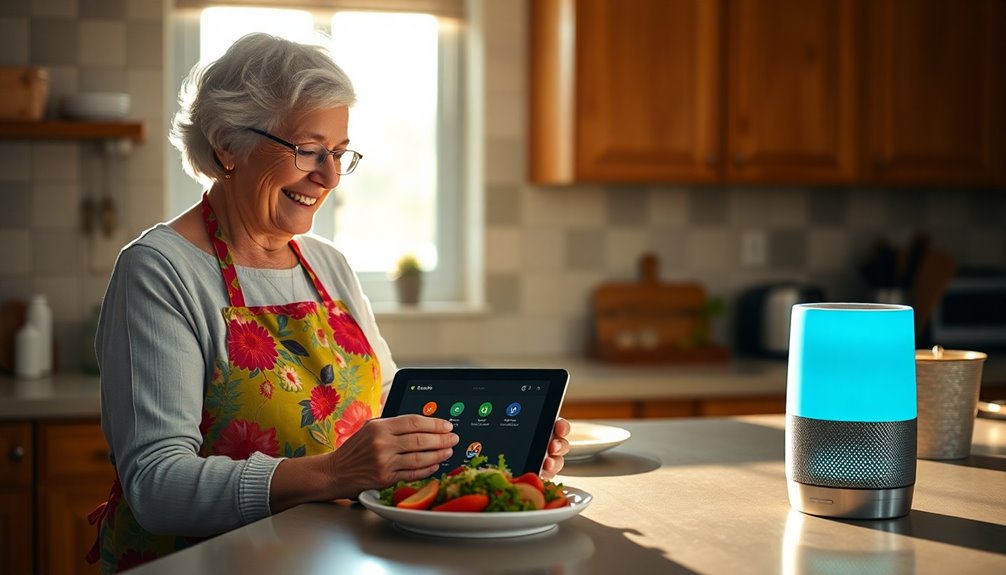
Virtual assistants like Alexa and Google Home let you manage daily tasks effortlessly using just your voice.
You can set up routine reminders and alerts for medications or appointments, ensuring you stay on track with your health.
This hands-free approach not only simplifies your life but also enhances your independence at home. Additionally, cybersecurity vulnerabilities can be a concern, so it's important to ensure that your devices are secured to protect your personal information.
Voice Command Functionality
As you navigate daily life, voice command functionality can become your reliable companion, helping you manage tasks hands-free. This assistive technology enhances independence by simplifying daily activities.
Here are four ways it can support you:
- Medication Management: Set reminders for medications and appointments without needing assistance.
- Home Control: Adjust lighting, thermostats, and security systems using just your voice, promoting safety.
- Communication: Stay connected with family and friends through voice calls and messaging, reducing feelings of isolation.
- User-Friendly Navigation: Access features easily, regardless of your digital literacy level, making technology more approachable. Additionally, this technology can help manage your pet care needs, including routine health checks for your furry companions, ensuring they remain happy and healthy.
Routine Reminders and Alerts
When it comes to managing daily tasks, routine reminders and alerts can make a significant difference in maintaining independence. Virtual assistants like Amazon Alexa and Google Home are great tools for setting medication reminders and daily task alerts. You can easily program these devices to remind you about meal preparation, appointments, and more, reducing forgetfulness. With voice-activated technology, you can manage tasks hands-free, enhancing your organization without struggling with buttons or screens. Additionally, incorporating home security systems can further enhance safety and peace of mind for seniors living independently.
| Task | Alert Type |
|---|---|
| Medication | Daily Reminder |
| Meal Preparation | Time Alert |
| Appointments | Calendar Reminder |
| Light Control | Voice Command |
Using virtual assistants promotes safety and autonomy, improving your overall quality of life.
Frequently Asked Questions
How Do Assistive Technologies Promote Independence?
Assistive technologies promote independence by giving you the tools to manage your daily life more effectively.
With smart devices, you can control your environment and set reminders for important tasks. Health monitoring systems allow you to track your well-being in real-time, while communication aids help you stay connected with loved ones.
Which Assistive Device Can Help Older Adults to Be More Independent?
If you're looking for an assistive device that boosts independence for older adults, consider a smart walker.
These devices enhance stability and come equipped with sensors to detect falls. They can alert you if you're unsteady, allowing you to navigate your environment safely.
Plus, many smart walkers have features like built-in GPS and communication tools, helping you stay connected while promoting confidence in your daily activities.
You'll feel more secure and independent.
How Can Assistive Technology Assist Elderly People?
How can you enhance your daily life? Assistive technology can play an essential role in supporting elderly individuals by simplifying tasks and promoting independence.
With smart home devices, you can control your environment effortlessly, while health monitoring systems keep track of your well-being.
Mobility aids like smart walkers help you move safely, reducing fall risks.
Communication tools enable you to stay connected with loved ones, alleviating isolation and boosting your overall quality of life.
How Do You Use Assistive Technology to Help Individuals Remain Independent or Active?
You can use assistive technology to enhance independence by integrating smart home devices that let you control your environment effortlessly.
Mobility aids like smart walkers help you navigate safely, while health monitoring devices keep track of your essential signs.
Communication tools, such as video calling apps, help you stay connected with family and friends.
Conclusion
In a world where every day can feel like climbing a mountain, these assistive technologies are your trusty hiking gear, making the trek easier and safer. Just like a robust walking stick helps you navigate rocky paths, smart home devices and health monitoring systems give you the support you need to maintain your independence. Embracing these tools not only enhances your daily life but also empowers you to confidently explore new horizons, one step at a time.
